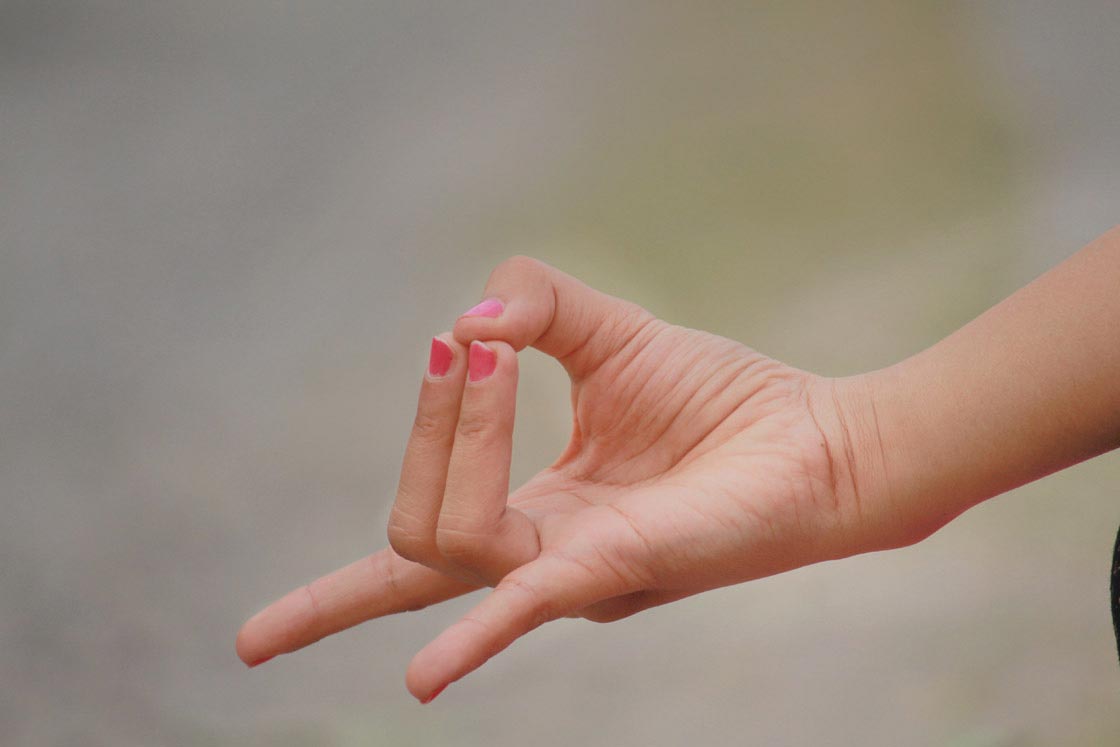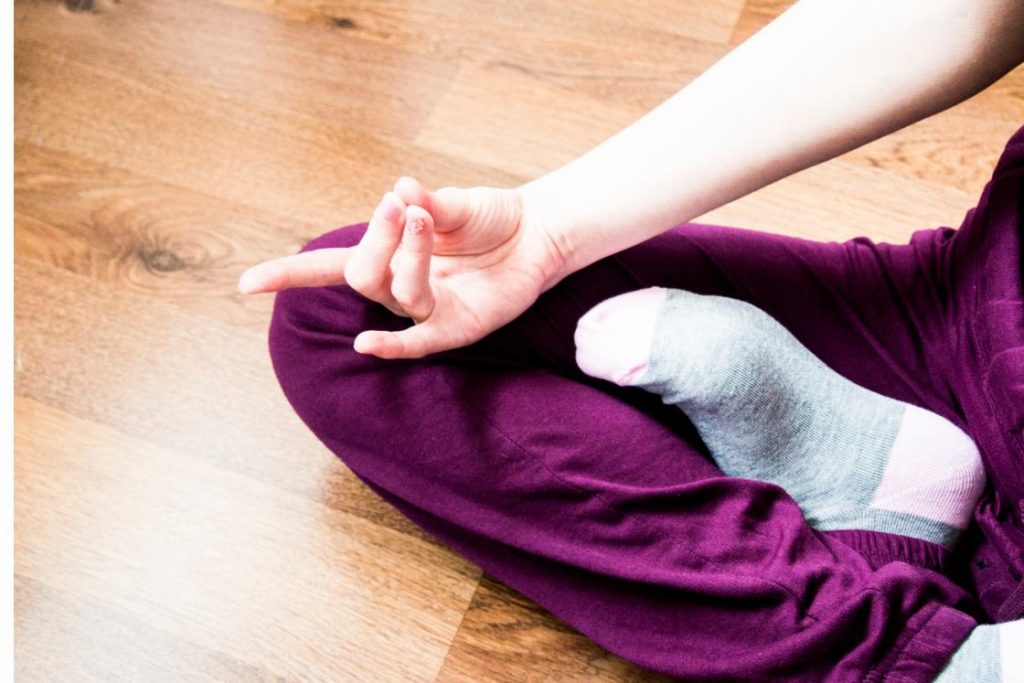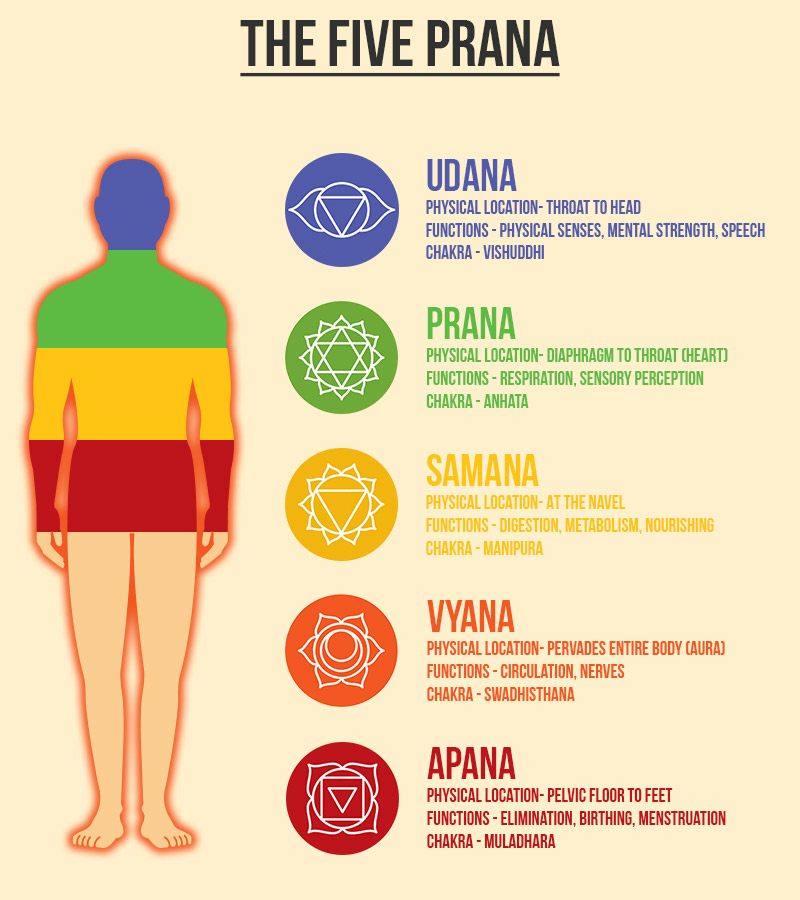
Apana Mudra is a significant hand gesture in yoga that plays a crucial role in detoxifying the body and mind. This mudra, which is part of traditional yogic practices, is designed to channel the body’s subtle life force energy, known as Prana.
By performing Apana Mudra, one can enhance the body’s natural ability to eliminate waste and toxins, promoting overall health and well-being.
What is Apana Mudra?
Apana mudra is a basic hasta mudra or yoga hand gesture that promotes the downward movement of energy in the body. It’s linked with Apana Vayu, one of the five prana vayus according to yogic tradition.
Because apana vayu is the energy governing the removal of waste in the physical body, apana mudra is good for detoxification of the body by eliminating toxins and waste. For women, it helps regulate the menstrual cycle. This is why it is also called the “Mudra for Purification“.
How to Do Apana Mudra?

The hand position of Apana mudra is very simple. You keep both hands straight, micro bend your middle and ring finger and join (these) fingertips with the thumb tip. Rest two fingers, index and pinky fingers are kept straight or lightly stretched. Make this gesture with both hands.
Typically, the ideal time to perform apana mudra is early morning to stimulate your bowel movement. When doing any other time of the day, you can do this mudra 2 hours after a meal for better digestion. Also, it can be done whenever you are feeling nauseous. Performing on an empty stomach can also prove to be beneficial.
Also read: When and what to eat before and after yoga
In addition to this, apana mudra should be done for 45 minutes to get optimum results. If you can’t sit 45 minutes at a stretch, in one session try to hold this mudra for 15 minutes. This way, do it 3 times a day.
Below are the steps to practice it;
- Sit comfortably on your yoga mat in a meditative position such as the lotus pose (padmasana) or easy pose (sukhasana). Your spine should be straight and your head properly aligned.
- Close your eyes and place your hands on your thighs or knees with palms up.
- Join the tip of the thumb to the tips of the ring and middle finger on both hands. The index finger and little finger should be kept straight, yet relaxed. Keep moderate pressure on the tips.
- Initially hold the mudra for a minimum of 10 minutes. Extend this duration up to 20 minutes.
- Slowly separate your finger and keep your eyes closed for another couple of minutes.
- Sit in silence before you get up from your position.
Benefits of Apana Mudra
- Detoxifies the body. Apana mudra helps the organ of excretion to remove bodily wastes and excess water in urine. Also, it’s a good mudra for kidney stones, bladder stones, and urinary tract related conditions.
- Strengthens the immune system. Apana mudra strengthens the immune system of the body. It eliminates free radicals that can damage cells and lower the body’s immune system.
- Improves digestion. Apana mudra strengthens the digestive organs‘ functions since it promotes the downward movement of energy. It also regulates better bowel movement and pushes the undigested food particles for elimination.
- Alleviates stomach problems. Regular practice of apana mudra removes and reduces the problem of constipation, acidity, gas, pain, indigestion, etc. by stimulating the abdominal organs.
- Prevent heart ailments and diseases, chest pains, and breathing disorders.
- Regulates the menstrual cycle. Women can especially benefit from apana mudra as it helps relieve cramps and problems of irregular cycles.
- Helps control diabetes. Apana mudra promotes relaxation and eliminates stress in diabetes patients. Research done in the past has proven the therapeutic benefits of Apana mudra in curing Diabetes, especially for type 2 diabetes patients.
- Makes you feel secure. Doing apana mudra with pranayama and meditation helps us calm inwardly. It aids in releasing unwanted emotions, thoughts, and experiences, thus making you feel more grounded and in control.
- Spiritual benefits. Apana mudra helps in awakening the kundalini energy. This mudra balances root chakra energy and thus helps in activating the kundalini shakti that resides in this chakra.
- It creates a direct link between Koshas (annamaya kosha, pranamaya kosha, and manomaya kosha). Direct link promotes a balance between the physical body, pranic body, and the mental body.
Precautions & Contraindications
- Pregnant women should not practice apana mudra for the first 8 months as the strong downward pull can lead to mishappenings. However, during the 9th month, you can practice this mudra to ease the process of childbirth.
- If you suffer from diarrhea, cholera, colitis, irritable bowel syndrome, inflammatory bowel syndrome or any digestion problem should practice this mudra with extreme caution. Consult a yoga teacher or your doctor.
- People having osteoarthritis or who have previously suffered from Chikungunya can have a problem with the movement of the fingers or hands. Such a person should consult a doctor before doing it regularly.
- Those with excess vata and kapha dosha should perform apana mudra in moderation.
How Does Apana Mudra Work?

As per yogic physiology, energy in our body moves in the form of 5 prana vayus. These are:
- Prana Vayu – Upward moving energy lies in the heart
- Apana Vayu – Downward moving energy lies in the core of the pelvic floor area
- Samana Vayu – Balancing energy lies at the navel
- Udana Vayu – The energy of movement lies in the joints of the body
- Vyana Vayu – Pervades whole body and mind
Out of these 5 pranas, apana vayu deals with excretion or removal of bodily wastes such as feces, gas, urination, sweating & bleeding during the menstrual cycle. The downward flow is also helpful at the time of childbirth.
The main purpose of doing apana mudra is to regulate apana vayu and hence clear all lower body imbalances and disturbances. In this mudra, the middle finger represents the outward moving energy, and the ring finger represents the downward moving energy.
When these fingers combine with the thumb (fire element), the resultant energy is channelled in the downward direction. This can alleviate problems like constipation, diarrhea, hemorrhoids, impotence, etc. All the problems that occur in the organs of the lower abdomen and pelvis can be taken care of by apana mudra.
Duration of Practice
Practicing Apana Mudra for 10-15 minutes at any time of the day is recommended. Additionally, incorporating it into your meditation practice thrice daily or for longer durations of 30-45 minutes can amplify its benefits, promoting overall heart health and well-being.
Apana Mudra relationship with Five Elements and Doshas

In doing Apana mudra you actually form two hand mudras together; Akash mudra (joining middle fingertip to thumb tip) and Prithvi mudra (joining ring fingertip to thumb tip). Therefore this mudra balance the energy of two of the five elements of the body.
Also read: Panch tatva – Five elements of the body
Apana mudra helps balance the earth and space elements in contact with the fire element.
- By balancing space element, apana mudra helps in diseases relating to the heart, lungs, ear and throat
- By balancing earth element, this mudra strengthens the physical body and fulfills vitamin/mineral deficiencies.
Apana mudra effectively increases the vata and kapha dosha while decreasing the pitta dosha. It regulates apana vata in terms of elimination, menstruation, and ejaculation. The heaviness created in the body due to an imbalance in the earth and space elements, restricting the outflow of waste, can be countered by the fire element.
The organs such as the colon, small intestines, and urinary bladder along with the organs of the reproductive system are effectively stimulated. This helps with the proper passage of farts, feces, and urine as well as successful delivery of the fetus and regulated flow during menstruation.
Moreover, apana mudra does not only help with physical elimination, it is extremely effective in removing negative thoughts from the mind.
Conclusion
If you’re facing troubles with your stomach or feel a heaviness in your body, apana mudra can aid in releasing this heaviness. It is a great mudra to complement your meditation and pranayama practice. It will also allow your mind to become calm and peaceful through the elimination of mental clutter.
So the next time you feel angry or frustrated or have an upset stomach, you know which mudra to practice.

